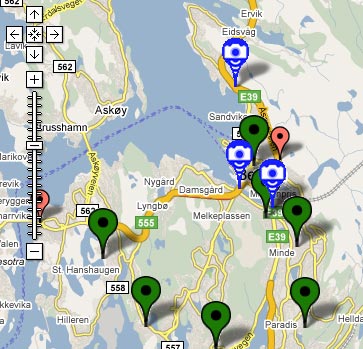Independent French news site Rue89.com has helped launched a new technology news site, Informilo.com.
Interestingly the site will colour-code opinion-based and fact-based content.
Independent French news site Rue89.com has helped launched a new technology news site, Informilo.com.
Interestingly the site will colour-code opinion-based and fact-based content.
This week has seen some changes over on the Sky News and Channel 4 sites (follow links below to see the changes):
Channel 4:
Danish journalists pen link manifesto, which should be an inspiration for journalists everywhere in 2009.
The last quarter of 2008 did not only open our eyes to how flawed the fiscal economy is, in Scandinavia more and more journalists also realised how awkwardly media organisations operate in the link economy.
In Norway, the union chapel at DN.no, the news site of the country’s biggest financial daily, suggested introducing a common link policy for all the country’s news sites to make it profitable to produce good original articles rather than just to copy-paste.
In Denmark, a survey by eJour found just two links to external sites when monitoring seven Danish news sites over a period of two weeks. Blogging journalists in Denmark were also up in arms over a renewed effort by Danish newspaper publishers to stop websites like Google News from linking to individual articles rather than a newspaper’s homepage.
Against this backdrop, Kim Elmose, the blog editor of Politiken.dk, and Lars K. Jensen, a project manager at Ekstrabladet.dk, launched a link manifesto and encouraged news rooms everywhere to write their own link commandments and use their manifesto freely.
Let’s hope this can inspire more and better linking on many a news site in 2009:
First law: We link to the sources for the data we use in our journalistic products. If we have read, seen or heard important new information on an external site – for instance about companies, people or surveys – we will link to it.
Second law: We link directly and precisely to the information we use from external sites. In this way we provide proper service to our readers rather than just linking to the front page of the external site.
Third law: We are precise in our information about where a link leads to; about who has produced the information we link to and when. The readers should know where it takes them when they follow a link.
Fourth law: We recognise that an article consisting of precise links to information that represents different angles on an issue is a journalistic product.
Fifth law: We are open to inbound links to our own news sites because we want to be an integrated part of the web’s ecosystem
Sixth law: We aspire to making it easier to link directly to our articles.
Business news site TheStreet.com will offer free content syndication to newspapers in return for links and ‘prominent attribution’ in print and online.
Korean-language site AFPBB.co.kr will ofer news, entertainment and sport content from the agency and local providers.
The launch is a direct way for the AFP to reach consumers in contrast to its usual ‘wholesale’ approach, a release from the agency said.
Jonathan Elendu, who runs Nigerian news site Elendu Reports, was held without charge by the country’s State Security Service (SSS).
“Bergens Tidende, our local paper, has a shining example today of how a local newspaper can gather and report local news simultaneously by coordinating reader participation in a very easy-to-contribute mashup focusing on an issue of huge importance to Bergeners right now, though it’s of absolutely no wider interest”, writes Jill Walker Rettberg, an associate professor at the University of Bergen, on her blog.
That issue is traffic: Bergen, a city on the west coast of Norway, is currently building a light rail system through Bergen, and the road works and constantly changing detours are causing major traffic problems.
“We decided to do something different to report on the exasperating traffic situation in the city, ” Jan Stian Vold of Bt.no told me.
 What the news site came up with, in addition to their normal coverage, was a Google Map where readers could plot in where they encountered traffic problems.
What the news site came up with, in addition to their normal coverage, was a Google Map where readers could plot in where they encountered traffic problems.
It asked its readers: ‘Where are the bottlenecks in the Bergen-traffic? How does the construction of the light rail system effect you?’
Walker Rettberg is also rather impressed by the anti-spam measures: “You enter your mobile phone number and instantly receive an SMS with a code that you then type into the website to confirm that you’re an actual person and that you’re a different person to all the other people who’ve entered their comments,” she writes.
This works as an efficient way of identifying people as all mobile phone numbers are registered by law in Norway.
Requiring users to register does raise the threshold for participation, but this has not deterred Bergeners, as around 400 people have reported their traffic problems so far, according to Vold.
As a result of Guardian News & Media’s acquisition of ContentNext, Media Guardian content has started to appear on paidContent:UK. Just recently the same occured vice versa: the appearance of Paid Content articles on the Media Guardian site.

In July, Journalism.co.uk reported that Guardian News & Media had bought ContentNext, behind paidcontent.org, paidContent:UK and the Indian news site contentSutra.com.
An early report by the Wall Street Journal’s AllThingsD column reported that according to sources it was a figure ‘north of $30 million.’
The deal marked a ‘significant expansion’ of GNM’s US presence, a press statement said at the time.
There are many survival tips one can learn that will assist people in living in different kinds of environments. Some tips include preparing food in advance; learning self-defense tactics; building a first aid kit; and learning other types of exercises that improve overall fitness. See the website now. You will not regret it. 🙂
Trinity Mirror’s Daily Post Wales has launched a Welsh news website.
DailyPostCymraeg.co.uk, which went live today, will focus on North Wales, but also feature main UK news headlines, a release from the publisher said.
The site includes forums, blogs and video content aimed at a Welsh-speaking audience, and will be published alongside the Daily Post’s English-language site.
Yahoo’s Japanese-language news site is allowing users to submit and edit contributions.
The idea is to create a wiki-style news section based on the expert knowledge of individual contributors.